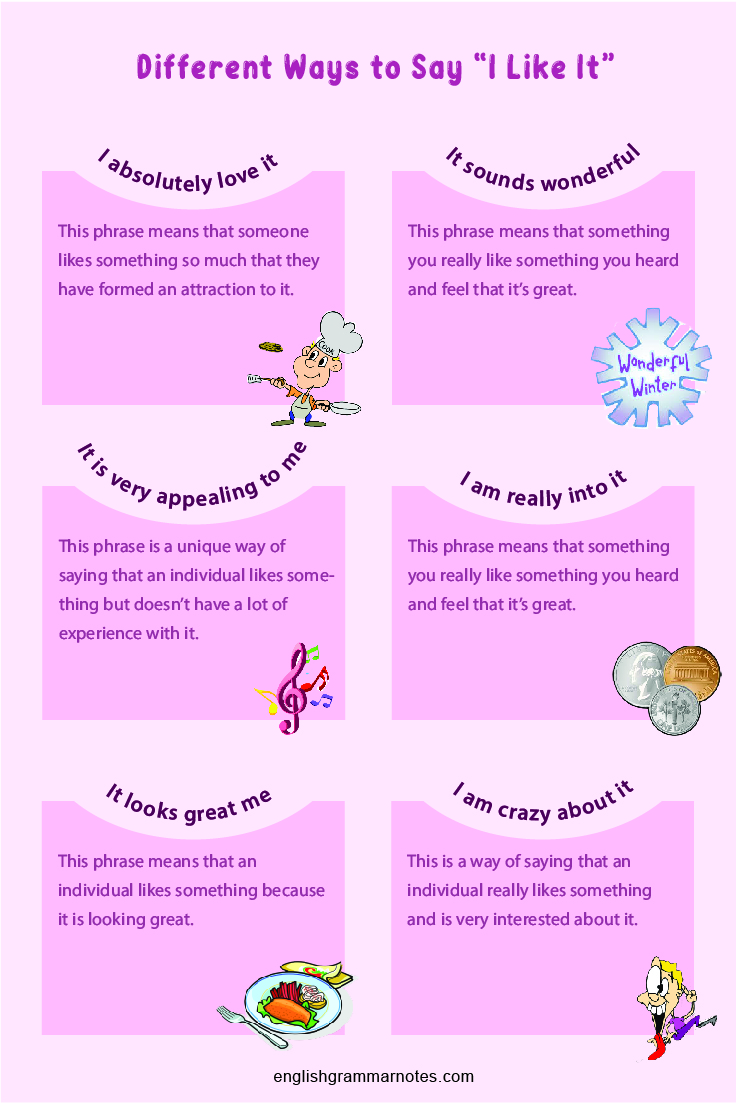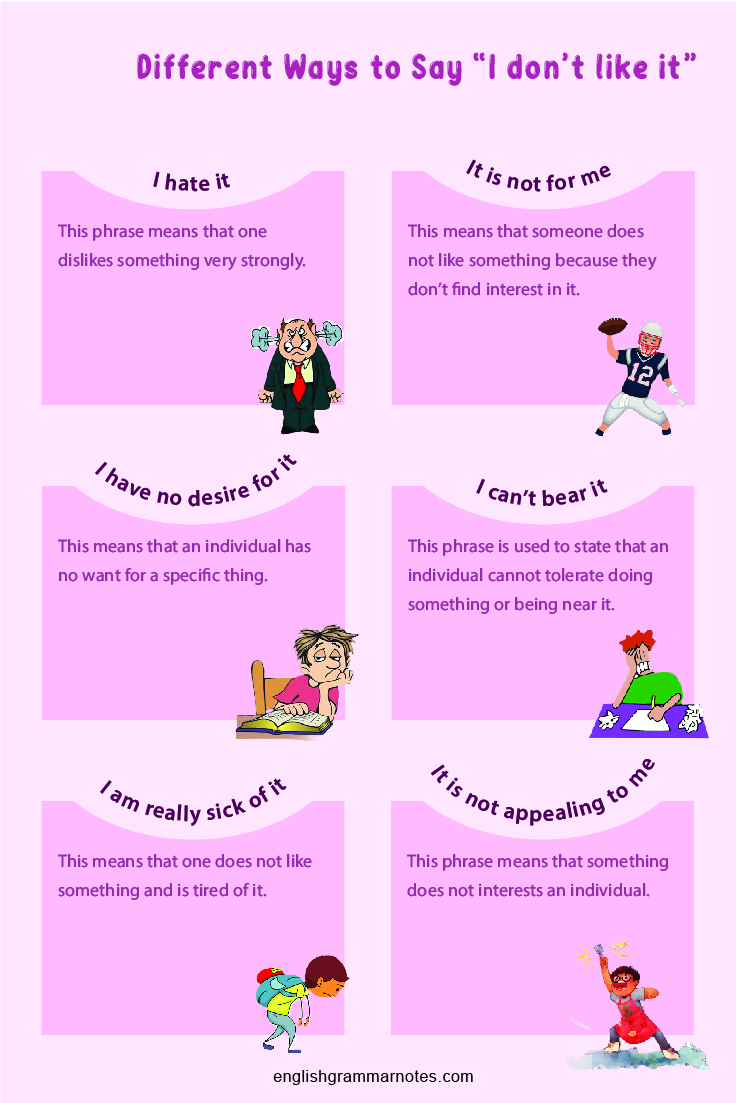Different Ways to Say “I Like It”/ “I Don’t Like It”: In the English language, common phrases like I like you and I don’t like you are used very frequently. It gets pretty boring for an individual to use I like phrases and I don’t like phrases repetitively to express their feelings. Since these are very common for describing different things like, food, clothes, human beings, etc., one must learn different ways of saying it.
Another way to say I really like or I really don’t like is using different languages. One may even learn how to say I like in French, Spanish, Japanese, and other languages to break the monotony.
This article is made for those first-time learners who needs to understand this terminology. One can also use these different ways and make an I like words PDF. Thus, this article consists of different ways on how to say I like it and I don’t like it.
Ways to Say “I Like It”/ “I Don’t Like It”
- Different ways of saying I like it
- Different ways of saying I don’t like it
- Saying I like it in different languages
- Saying I don’t like it in different languages
- Conclusion
Different ways of saying I like it
I absolutely love it
This phrase means that someone likes something so much that they have formed an attraction to it.
For example, Cooking is so great, I absolutely love it.
I am really passionate about it
This phrase means that one has so deep liking in something that they have developed passionate feelings for it.
For example, Playing guitar is my whole life, I am really passionate about it.
Ohmygod, that’s sick!
This is an informal phrase that one uses if they like something. The use of this is mostly seen in urban areas by kids and young adults.
For example, Ohmygod, the new movie that released last week is sick!
It sounds wonderful
This phrase means that something you really like something you heard and feel that it’s great.
For example, I heard your plan, it sounds wonderful!
It is very appealing to me
This phrase is a unique way of saying that an individual likes something but doesn’t have a lot of experience with it.
For example, the concept of the musical is very appealing to me.
I have a very soft spot for it
This phrase means that an individual likes something a lot and has a lot of affection amd weakness towards it.
For example, I have a very soft spot for animals.
It has a special place in my heart
This is a way in which an individual can say that they really like something and has an emotional connection with it.
For example, even though my best friend and I don’t interact anymore, she will always have a special place in my heart.
I am really into it
This phrase means that an individual is interested in something and really likes it.
For example, I am really into collecting coins from different time periods.
It looks great
This phrase means that an individual likes something because it is looking great.
For example, the dinner looks great tonight since mom cooked it.
I am very fond of it
This is a way of saying that an individual really loves and likes something.
For example, rabbits are adorable, I am very fond of them.
I am crazy about it
This is a way of saying that an individual really likes something and is very interested about it.
For example, Joshua is crazy about the song Sunday Morning.

I cherish it
This phrase means that someone really cares deeply about something.
For example, Pam cherishes the songs that were written for her.
I have a great desire for it
This is a way of saying that an individual really likes and longs something.
For example, I have a great desire for music.
It is something I cannot say no to
This is a way of saying that an individual likes something to such an extent that they cannot stop having or doing it.
For example, Hamburger with extra cheese is something I cannot say no to.
I have grown attached to it
This is a way of saying that an individual likes something and they have developed a bond with it.
For example, I have really grown attached to the plants we bought last week.
I bet everyone loves it
This phrase means that one loves something very much and is sure that everyone will do the same.
For example, Sara exclaimed that the Italian cuisine is delicious and she bets that everyone will love it.
It seems very interesting
This is a unique way of saying that one likes something and feels that it is interesting.
For example, the book you were reading yesterday seemed really interesting.
I can never get enough of it
This phrase means that someone likes something so much that they want it always.
For example, Monica feels that going on long drives is something she can never get enough of.
I don’t know really why anyone would dislike it
This phrase means that an individual likes something extremely and they cannot imagine that someone else won’t like it.
For example, volleyball is such a great game. I do not know why anyone would dislike it.
I was so very into it, I lost track of time
This phrase states the situation where an individual is so involved in doing something that they forgot to keep a track of their time.
For example, I was so into painting her portrait, that I lost track of time.
Different ways of saying I don’t like it
I hate it
This phrase means that one dislikes something very strongly.
For example, the drink she gave me tastes very bad. I hate it.
It doesn’t really tickles my fantasy
This phrase means that something is not interesting since it does not tickle one’s interest or liking.
For example, you may like horse riding, but it doesn’t really tickles my fantasy.
It is definitely not my cup of tea
This is a way of saying that an individual dislikes a thing and they don’t want to do it.
For example, going window-shopping is definitely not my cup of tea.
It is not for me
This means that someone does not like something because they don’t find interest in it.
For example, football is not for me.
I don’t know why anyone would like it
This is a unique way of saying that one dislikes something so much that they can’t figure out why anyone else would like it.
For example, the movie was horrible, I don’t know why anyone would like it.
I have no desire for it
This means that an individual has no want for a specific thing.
For example, everyone loves having mango, but I have no desire for it
It is not appealing to me
This phrase means that something does not interests an individual.
For example, John’s idea for the concert is not appealing to me

I don’t really even want to think at all about it
This phrase means that someone dislikes something so much that they don’t even want to consider thinking about it.
For example, I don’t even want to think about my trip; it was awful.
I can’t bear it
This phrase is used to state that an individual cannot tolerate doing something or being near it.
For example, I can’t bear the headache that I’m having right now.
I am really sick of it
This means that one does not like something and is tired of it.
For example, I am really sick of listening to your same complaints.
I really do not appreciate it
This is a unique way of saying that one particularly enjoy something.
For example, I really didn’t appreciate the questions they asked for the interview.
I am not very fond of it
This is a way of saying that an individual does not like something very much.
For example, I am not very fond of the idea of having ice-cream in winter.
I will pass
This phrase means that an individual does not like or is not interested in a particular thing and therefore won’t go ahead with it.
For example, James said to his friends, “I’ll pass on that one, you guys go ahead” when they asked him to join them on the trip.
Saying I like it in different languages
In Hindi: Mujhe yeh pasand hai
In French: je l’aime bien
In Chinese: Wǒ xǐhuān
In Spanish: Me gusta
In German: ich mag das
In Japanese: Sore wa īdesu ne
In Italian: mi piace
In Greek: mou arései
Saying I don’t like it in different languages
In Hindi: Mujhe yeh pasand nahi hai
In French: je n’aime pas ça
In Chinese: Wǒ bù xǐhuān
In Spanish: No me gusta
In German: gefällt mir nicht
In Japanese: Watashiwa sore ga sukide wa arimasen
In Italian: non mi piace
In Greek: Den mou arései
Conclusion
There are various different ways of saying I like it and I don’t like it. For first-time learners and for those who want to learn how to say these phrases in different languages and ways, this article is for you. This will help you to have a broad knowledge regarding the English language and also an idea about other languages.